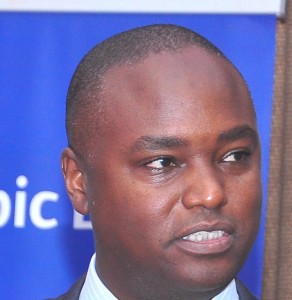Stanbic Bank plans new Kampala business incubator

Mweheire said the incubator will provide an enabling environment for SMEs to enhance their capacity.
February 6—Stanbic Bank Uganda (SBU), the country’s biggest bank, is to open a business incubator in Kampala to enable small and medium enterprises (SMEs) overcome capacity and other challenges that prevent them from growing.
“The incubator will provide an enabling environment for SMEs to enhance their capacity, enabling their businesses to survive, operate successfully and grow,” Patrick Mweheire, the SBU Chief Executive said while giving a presentation at the recent Skilling and Local Content Forum in Kampala.
The forum was organised jointly by the education and sports ministry and the Uganda Chamber of Mines and Petroleum to brainstorm ways for Ugandans to take up opportunities in the budding oil and gas industry.
Latest figures show there are about 160,000 micro, small and medium enterprises (MSMEs) in Uganda. However Mweheire said although Uganda ranks as a top entrepreneurial country in the world, few of these enterprises survive for very long. Some 80% do not make it to their third birthday yet 2.5 million people are employed in this segment of the economy.
He listed several factors that are handicapping small businesses which account for 90% of the country’s private sector. These included lack of entrepreneurial, management and business skills and lack of business plans and financial records.
Other challenges are limited and insufficient financial resources and poor banking and borrowing history which reduces their chances of getting credit. Fierce local and international competition and limited access to Business Development Services pose problems for Ugandan SMEs’ success.
Mweheire also cited low corporate governance, together with a culture that disrespects business contracts. He said entrepreneurial development needs funding, resources and access to markets.
Mweheire said, “By participating in the entrepreneurial development programme at the new incubator, the entrepreneur will get knowledge, information and a SME toolkit on top of a feedback mechanism for self-learning. They will also benefit from personal mentoring and coaching after training together with marketing guidance and market access. We hope to also advise them on access to various resources including financial resourcing.”

 African Heads of state head to South Korea next week for Summit talks
African Heads of state head to South Korea next week for Summit talks
 Trading leads as main source of income for Ugandans
Trading leads as main source of income for Ugandans
 New leadership for bankers’ umbrella as total assets top $12 billion
New leadership for bankers’ umbrella as total assets top $12 billion
 Brussels Airlines to announce Nairobi service
Brussels Airlines to announce Nairobi service
 SITA promises enhanced travel experience after Materna acquisition
SITA promises enhanced travel experience after Materna acquisition
 Saudia’s 105 aircraft order stretches A320neo lead over rival Max
Saudia’s 105 aircraft order stretches A320neo lead over rival Max
